‘Our New President’ revisits Trump’s election and fake news – from Russia’s perspective
 The 8th Annual Fort Myers Film Festival invades venues across Lee County between March 21 and March 25, and one of the more controversial films that will be shown during the fest’s five-day run is sure to be Our New President, an archival documentary that explores the cult of Donald J. Trump through fake news and other methods of destabilized perception.
The 8th Annual Fort Myers Film Festival invades venues across Lee County between March 21 and March 25, and one of the more controversial films that will be shown during the fest’s five-day run is sure to be Our New President, an archival documentary that explores the cult of Donald J. Trump through fake news and other methods of destabilized perception. 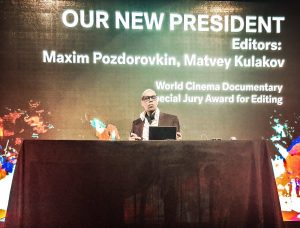 Compiled from state-controlled political programming and congratulatory addresses to Trump from average Russians, the film shows that Russia’s fawning over Trump was actually a carefully-manufactured ideological project.
Compiled from state-controlled political programming and congratulatory addresses to Trump from average Russians, the film shows that Russia’s fawning over Trump was actually a carefully-manufactured ideological project.
Our New President was one of the opening night films at this year’s Sundance Film Festival. It tells the story of  Donald Trump’s election entirely through the aperture of footage drawn from Russia’s state-sponsored propaganda machine and amateur YouTube clips. By turns alternately horrifying and hilarious, the film paints a satirical portrait of Russian meddling in the 2016 election that explains why the Russians are proud to call Donald Trump “our new president.” Although Trump doesn’t even appear until more than 15 minutes into the film, he is portrayed pretty much right from the jump as a flunky of Vladimir Putin or, as one YouTuber puts it, conclusive proof that “a woman can never be made president.”
Donald Trump’s election entirely through the aperture of footage drawn from Russia’s state-sponsored propaganda machine and amateur YouTube clips. By turns alternately horrifying and hilarious, the film paints a satirical portrait of Russian meddling in the 2016 election that explains why the Russians are proud to call Donald Trump “our new president.” Although Trump doesn’t even appear until more than 15 minutes into the film, he is portrayed pretty much right from the jump as a flunky of Vladimir Putin or, as one YouTuber puts it, conclusive proof that “a woman can never be made president.”
The film is directed by New York-based documentarian Maxim Pozdorovkin, whose earlier doc Pussy Riot: A Punk Prayer won a prize at Sundance  in 2013.
in 2013.
“[T]his is … an impressively assembled work, edited with brio by Pozdorovkin and Matvey Kulakov,” writes reviewer Leslie Felperin for The Hollywood Reporter on January 18. “Moreover, even the most hardened news junkies, accustomed by now to the near-daily drip-feed of crass, offensive utterances from Trump and his more troglodyte American 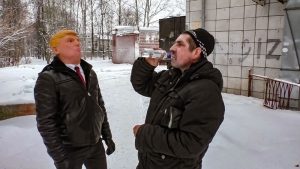 supporters, may gasp at the open misogyny, racism and sheer stupidity on display here from some citizens of the steppes. It’s not all positive, however — a TV palm reader traces a line on Trump’s unusually short thumb, as he points out, indicating a lack of higher cognitive ability.”
supporters, may gasp at the open misogyny, racism and sheer stupidity on display here from some citizens of the steppes. It’s not all positive, however — a TV palm reader traces a line on Trump’s unusually short thumb, as he points out, indicating a lack of higher cognitive ability.”
 Felperin goes on to point out that while the Russian press and public don’t apparently know any more than we do about the nature and extent of their government’s tactics to shape the outcome of the 2016 election, they’re just less shocked by it.
Felperin goes on to point out that while the Russian press and public don’t apparently know any more than we do about the nature and extent of their government’s tactics to shape the outcome of the 2016 election, they’re just less shocked by it.
Of course, the documentary makes it clear that Russian citizens are largely brainwashed by Russia’s all-fake-all-the-time news culture. Writing for Variety, reviewer Owen Gleiberman remarks that what the film “reveals is that fake-news culture is now an escalating global phenomenon, a tidal wave of untruth that’s growing and surging in power: in Europe, in the United States, and in the authoritarian regimes — like Russia’s — that perfected this virus in the first place. 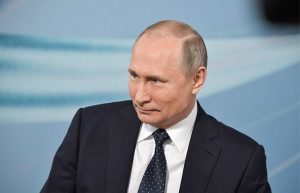 It’s a brave new world, but in many ways it’s an old world, a medieval cosmos of strong-man heroes, and evil spirits doing battle, and more and more of the masses of men and women reduced to brainwashed pawns.”
It’s a brave new world, but in many ways it’s an old world, a medieval cosmos of strong-man heroes, and evil spirits doing battle, and more and more of the masses of men and women reduced to brainwashed pawns.”
Both Leslie Felperin and Owen Gleiberman agree that the documentary doesn’t really present any new facts of information.  It’s a montage of information that’s already in the public domain that’s been reconfigured to tell a story. But what may seem new to American audiences is the manner and degree to which Russian president Vladimir Putin has co-opted Russian media.
It’s a montage of information that’s already in the public domain that’s been reconfigured to tell a story. But what may seem new to American audiences is the manner and degree to which Russian president Vladimir Putin has co-opted Russian media.
 “The film chronicles how Putin remade the Russian media, gutting the nation’s one relatively free and objective news program, NTV, and consolidating state control over Russia 1, the nightly news show broadcast from a studio located in Ostankino Tower, the radio and television space needle built by the Soviet regime in 1967. (It’s the tallest
“The film chronicles how Putin remade the Russian media, gutting the nation’s one relatively free and objective news program, NTV, and consolidating state control over Russia 1, the nightly news show broadcast from a studio located in Ostankino Tower, the radio and television space needle built by the Soviet regime in 1967. (It’s the tallest  free-standing building in Europe.),” writes Gleiberman in the January 19 Variety review of Our New President.
free-standing building in Europe.),” writes Gleiberman in the January 19 Variety review of Our New President.
Supplementing NTV today is RT (Russia Today), an international news channel that is viewed nightly by a global audience of more than 700 million in 100 countries.
 “Who shills for Russia Today, peddling lies and tabloid hokum?” Gleiberman asks. “Roger Stone does – and so, as we see, does Larry King.”
“Who shills for Russia Today, peddling lies and tabloid hokum?” Gleiberman asks. “Roger Stone does – and so, as we see, does Larry King.”
And if RT sounds vaguely familiar, it’s because former Trump Administration National Security Adviser Michael Flynn was the man seen seated between RT head Margarita Simonyan and Vladimir Putin at that  black-tie dinner thrown to celebrate RT’s 10-year anniversary that figured prominently in the indictment brought by Robert Mueller against the retired general (and to which he has pleaded guilty and is now awaiting sentencing).
black-tie dinner thrown to celebrate RT’s 10-year anniversary that figured prominently in the indictment brought by Robert Mueller against the retired general (and to which he has pleaded guilty and is now awaiting sentencing).
Regardless, the film makes the point that Putin views  broadcasting as a tool to be employed toward the achievement of a intransigent end – elevating Russia as a world power while simultaneously diminishing the role and influence of the United States and its key European allies.
broadcasting as a tool to be employed toward the achievement of a intransigent end – elevating Russia as a world power while simultaneously diminishing the role and influence of the United States and its key European allies.
“In Putin’s Russia, what matters is that broadcasting is a medium for ensuring unity and the message itself doesn’t matter very much,” writes Charlie Phillips for The Guardian in his review of the film. “Putin’s Russia and Trump’s America rely not only on fake news, but also fake humans consuming it who are happy with the fakeness if it’s a good spectacle and a laugh. For making smart observations like this that creep up on one slowly, and maintaining constant interest in a film crafted with such  complexity, Pozdorovkin is to be congratulated.”
complexity, Pozdorovkin is to be congratulated.”
You will have four chances to see the film on Saturday, March 24. It will be shown at new FMff partner AMC Classic Merchants Crossing 16 in North Fort Myers at 11:30 a.m. and at 3:00, 7:00 and 9:00 p.m. The documentary has a 77-minute running time.
March 19, 2018.
RELATED POSTS.
- What’s Melissa wearing?
- A gift, synchronicity, the designer and ‘The Dress’
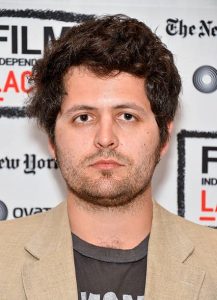 Red carpet gala celebrates film, filmmakers and film lovers
Red carpet gala celebrates film, filmmakers and film lovers- About the 8th Annual Fort Myers Film Festival
- Fort Myers Film Festival to open with ‘Melody Makers’ rock doc
- Photographer Barrie Wentzell in the frame
- ‘Melody Makers’ director Leslie Ann Coles in the frame
- “What is Classic Rock’ is all about the music
- ‘Don’t Sell My Guitars’ love letter by filmmaker Lynn Montgomery to her dad
- ‘The Maestro’ looks at post-World War II Hollywood film composers
- The Maestro’s Mario Castelnuovo-Tedesco in the frame
 ‘Let It Shine: The Story of the Women’s March SLO’
‘Let It Shine: The Story of the Women’s March SLO’- ‘Kids News’ a tribute to Naples’ Judy Lawrence
- Fort Myers Film Festival to screen sensational new Ruth Bader Ginsburg doc
- ‘RBG’ doc filmmakers Betsy West and Julie Cohen in the frame
- ‘NOA’ enigmatic film about the price of freedom
- ‘NOA’ filmmaker Angel Barroeta in the frame
- ‘NOA’ leading actor Hunter Hall in the frame
- ‘GAUZE: Unravelling Global Healthcare’ takes fear out of falling ill abroad
- ‘GAUZE’ filmmaker Suzanne Garber in the frame
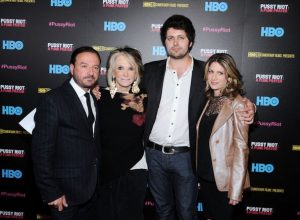 ‘Lost Springs’ documents one artist’s quest to capture Florida springs drowned by purposeless dam
‘Lost Springs’ documents one artist’s quest to capture Florida springs drowned by purposeless dam- ‘Lost Springs’ filmmaker Matt Keene in the frame
- ‘Lost Springs’ artist Margaret Ross Tolbert in the frame
- Florida photographer Karen Glaser also focuses on North Florida springs
- ‘Arcade Creek Project’ doc tells story of Cal high school students working to save dying ecosystem
- ‘Arcade Creek Project’ filmmaker Jierel Almario in the frame
- Beautifully shot, ‘Carol’s Last Chance’ depicts soon-to-be father runnin’ against the wind
- ‘Carol’s Last Chance’ filmmaker Jordan Axelrod in the frame
- ‘Morning Light Seems the Brightest’ a short indie from talented newcomer Melina Valdez
- ‘Boys School’ tells harrowing tale of 111 years of abuse, rape and murder
- ‘Boys School’ writer and director Ric Acevedo in the frame
- ‘The Age of Imitation’ explores desire, delusion and the naivety of millennial artistic ego
- What’s Melissa wearing?
- ‘Full Circle’ documents NFL receiver Anquan Boldin’s efforts to help those in need
- ‘Our New President’ revisits Trump’s election and fake news – from Russia’s perspective
- ‘Our New President’ filmmaker Maxim Pozdorovkin in the frame














 Tom Hall is both an amateur artist and aspiring novelist who writes art quest thrillers. He is in the final stages of completing his debut novel titled "Art Detective," a story that fictionalizes the discovery of the fabled billion-dollar Impressionist collection of Parisian art dealer Josse Bernheim-Jeune, thought by many to have perished during World War II when the collection's hiding place, Castle de Rastignac in southern France, was destroyed by the Wehrmacht in reprisal for attacks made by members of the Resistance operating in the area. A former tax attorney, Tom holds a bachelor's degree as well as both a juris doctorate and masters of laws in taxation from the University of Florida. Tom lives in Estero, Florida with his fiancee, Connie, and their four cats.
Tom Hall is both an amateur artist and aspiring novelist who writes art quest thrillers. He is in the final stages of completing his debut novel titled "Art Detective," a story that fictionalizes the discovery of the fabled billion-dollar Impressionist collection of Parisian art dealer Josse Bernheim-Jeune, thought by many to have perished during World War II when the collection's hiding place, Castle de Rastignac in southern France, was destroyed by the Wehrmacht in reprisal for attacks made by members of the Resistance operating in the area. A former tax attorney, Tom holds a bachelor's degree as well as both a juris doctorate and masters of laws in taxation from the University of Florida. Tom lives in Estero, Florida with his fiancee, Connie, and their four cats.